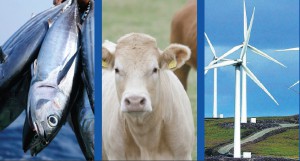Brexit and Its Potential Impacts on Northern Ireland’s Environment
Context
Brexit, the decision by the people in the UK to leave the EU, is over and done with. There is the minor issue of what it means and what effects it will have on the people of the UK.
All of the Brexit options remain uncertain, largely because almost no one in the UK, including NI, planned on what to do in case of a favorable Brexit vote. A helpful primer on what Brexit may mean for Northern Ireland (NI), in general, is a recent report from EU DebateNI, an effort set up by the Centre for Democracy and Peace Building, whose Directors include John Alderdice Jeffrey Donaldson and Liam Maskey. The report, After the EU Referendum: Establishing the Best Outcome for Northern Ireland (September 2016), asks the basic question, “Where are we and what might happen next?” It is a helpful assessment and is measured in its responses to that question.
Gary Gavan
While it remains speculative to talk about how Brexit will unfold, we will not be as measured in suggesting some consequences for the environment and advising where you might place your bets. It’s just about possibilities or probabilities, and imagining what might happen. As Freud wisely counseled: imagining something happening can sometimes become helpful in making it happen, or avoiding it. The fantasy helps prepare for the eventuality.
Some Places to Place Bets
With regard to the vote over Brexit, things in Northern Ireland, as usual, are more complicated than elsewhere. While England and Wales voted in favor of leaving the EU, Northern Ireland (NI) and Scotland voted to remain in the EU. In NI the vote was 55.8 in favor of staying, 44.2% in favor of leaving; in Scotland, it was 62% in favor of staying and 38% for leaving. Not only was the vote closer in NI (11.6% differential compared to 24% differential in Scotland), but there was a fracture in the voting along political/cultural fault lines. It is not possible to count “unionist” and “nationalist” votes but it is clear that the Nationalist parties — Sinn Fein (SF) and the Social Democratic and Labour Party (SDLP) —supported staying in the EU, as did the Alliance Party and the smaller Ulster Unionist party, while the larger Democratic Unionist Party supported leaving the EU, as did the Traditional Unionist Voice and UK Independence Party (Ukip). The vote tallies in the 18 constituencies of NI, each typically dominated by either a nationalist or unionist population, reflected this support. Overall, 11 of the 18 constituencies, including all the regions along the border with the RoI, voted to stay.
Simple majorities in NI politics are usually not sufficient to declare a victory, or get action done. For example, in the NI Assembly the D’Hondt principle applies to ensure that Northern Ireland’s largest voting blocs, unionists and nationalists, both participate in governing the region. Neither can rule without some support from the other.
One consequence of this particular split is that the DUP First minister will advocate on behalf of those who voted to leave in any Brexit discussions or negotiations, while the SF Deputy First Minister likely will not engage with British politics and so no one will speak for those who voted to stay in the EU. And to the extent that the DUP is less environmentally friendly than the SDLP, or Sinn Fein, a loss of a voice on behalf of the nationalist community will hurt efforts to protect the environment.
Statements from the PM May/Tory government indicate that it will listen to the devolved administrations in NI, Scotland and Wales regarding protecting the interests of all constituencies in the UK during the Brexit negotiations with the EU. While it may listen, it need not heed and it seems clear enough that the British PM May/Tory government will decide what is best for the UK. The devolved administrations will just to live with that. Any environmental issue that comes up in the Brexit negotiations will be resolved to satisfy Tory party positions.
Keep your eye on what the May/Tory government does with farming, fracking, renewable energy, and climate change. These well may be contentious issues.
There are 29,000 workers in the agriculture sector in NI, and it contributes 2.4% of the economic output. It is also a major source of Greenhouse gases (GHG), particularly methane. But the critical fact is that 90% of income for farmers in NI comes from the EU Common Agriculture Policy (CAP). That CAP goes out the window with Brexit. The UK politicians supporting leaving the EU have encouraged the view that the UK government will simply replace that money with public English funds. Yet all sectors of the economy will suffer from Brexit and there is only so much money in the UK purse. Moreover, the UK has been in the process of winding down its bracing of the NI economy with public sector jobs. Is it going to fund NI farmers to the same extent it supported the public sector? Probably not, despite the powerful agriculture lobby. Will it insist, as the National Trust does, that farmers need to do even more to protect the environment? Probably not. It is equally likely that the UK government support for agriculture could return to a price support mechanism dependent on production and disconnected from environmental improvements.
Fracking is becoming increasingly unpopular in NI and many NI politicians have expressed opposition to it. Yet the UK government is deeply committed to fracking and is making it easier for fracking companies to acquire necessary planning and other permissions by taking decisions out of the control of local officials. To the extent that the UK government is the beneficiary of the rental income from fracking, where the Crown Estate owns the mineral rights, it is not hard to imagine that the government in London would be inclined to force NI to accept fracking (it does control a large part of the NI budget) and use the proceeds to fund some of the costs of Brexit. As long as the proceeds make their way to London, it will matter less if the adverse environmental and health impacts are left behind in Fermanagh and elsewhere.
Just as the UK government is pushing fracking, in part by taking away control over related planning decisions from local government, at the same time it is pushing for local control over onshore wind farms because it believes there is significant local opposition to wind farms. In the UK government view of the world, fossil fuels like natural gas are reliable and familiar, and anything to hold off the inevitable surge of renewables will give breathing room for the short-term friendly fossil fuelists’ profit margins. Whether the post-Brexit UK government will push for the same agenda in NI remains to be seen.
Climate change may survive less affected by Brexit as the UK has a reputation for progressive action on climate change, and the Climate Change Act is embedded in UK law, as is the Climate Change Committee that is part of that Act. Of course, even this issue can be watered down or significantly altered if Brexit becomes an onerous financial burden and the government looks for a scapegoat to blame, like environmental regulations. Deregulation often becomes the cry of first resort when a financial crisis is felt. So you might want to hedge your bet on climate change surviving unmolested.
Sources:
Professor David Phinnemore and Dr. Lee McGowan, After the EU Referendum: Establishing the Best Outcome for Northern Ireland (September 2016), Centre for Democracy and Peace Building – EU Debate NI. democracyandpeace.org/wp-content/uploads/2016/09/Establishing-the-Best-Outcome-for-Northern-Ireland.pdf
Amanda Ferguson, “Brexit: Northern Ireland votes to remain in the EU,” The Irish Times (23 June 2016). www.irishtimes.com/news/ireland/irish-news/brexit-northern-ireland-votes-to-remain-in-the-eu-1.2697132
Peter Geoghegan, “Northern Ireland left reeling after Brexit vote,” DW (27 June 2016) [Deutsche Welle] www.dw.com/en/northern-ireland-left-reeling-after-brexit-vote/a-19359521





No comments yet, add your own below